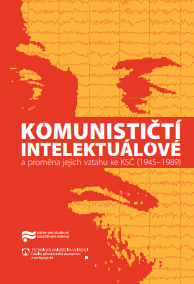Historik ve spárech politiky Milan Hübl v šedesátých letech dvacátého století
Historic in the whirlwinds of politics - Milan Hübl in 1960s
Author(s): Zdeněk Doskočil
Subject(s): Political history, Social history, Recent History (1900 till today), Post-War period (1950 - 1989), History of Communism
Published by: Ústav pro studium totalitních režimů
Keywords: Czechoslovakia; 20th century; intellectuals; Milan Hübl; communist party;
Summary/Abstract: Czech historian Milan Hübl (1927-1989) is mostly remembered in connection with the political career of Gustáv Husák, whom he helped to return to politics in 1960s. The contemporary historiography has paid a much lesser attention to Hübl’s polytematic research work and political activities during so-called Prague spring and dissent. In 1960s Hübl was one of the important intellectuals, who formed and influenced the public discourse in a reformist sense. His papers and disputations were a part of critical attacks of Czech and Slovak Marxist historians, who got rid of the restrictions of the dogmatic Stalinism and thought over the former schematic assessments of events from KSČ and Czechoslovak history. He was probably the first Czech post-war historian, who started to research the relations between Czechs and Slovaks. In the Czech environment he was particular thanks to a rare sensitivity to Slovak issues and empathy to opinions of intellectuals from Bratislava. He was aware, that the solution for relationship of the both nations is the key for the success of the reformist movement in the whole state. Interest in Slovak issues quickly dragged him into politics. He became to be well known in 1963–1964 period, thanks to his employment in Barnabitska Rehabilitative Committee and publishing of few papers criticizing attitude of Czech intellectuals to Stalin’s repressions. This led him into conflict with the party and he got a label of nonconformist rebel. In 1968 he entered the high politics. He became a chancellor of the University of Politics, he collaborated on preparations of the Constitutional Act on the Czechoslovak Federation and in August 1968 he became a member of the Central Committee of the Czechoslovak Communist Party. After the soviet occupation he had to face attacks of conservative dogmatics. Gustáv Husák, who became a first secretary of the Communist party of Czechoslovakia in April 1969 largely thanks to Hübl, disavowed him. Hübl was dismissed from all political positions, expelled from the party and prohibited from working in his field of specialization. He did not give up and took part in various activities of the reformist communist opposition, which led to his arrest. In summer 1972 he was sentenced to six and a half years in prison.
Book: Komunističtí intelektuálové a proměna jejich vztahu ke KSČ (1945-1989)
- Page Range: 128-173
- Page Count: 46
- Publication Year: 2013
- Language: Czech
- Content File-PDF

